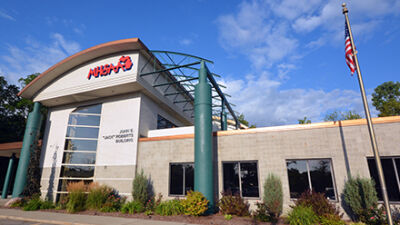
Improper recycling of items such as wire hangers, plastic bags and Christmas lights can lead to problems at recycling centers.
Photo provided by Jeff McKeen
METRO DETROIT — The Southeastern Oakland County Resource Recovery Authority is partnering with several other local groups and municipalities to use grant funding to improve recycling habits around metro Detroit.
With the assistance of a $169,756 grant, SOCRRA will launch The Recycling Partnership’s Feet on the Street cart tagging recycling initiative — a communitywide initiative to improve the quality of recycling in single-stream curbside recycling bins by providing residents personalized and real-time curbside recycling education and feedback.
“The original funding source is from Renew Michigan, which was passed out of a Senate bill in 2019,” explained Devan Dodge, of the Department of Environment, Great Lakes, and Energy. “Per year, there’s a statutory requirement that a certain amount of money goes toward a recycling program.”
The initiative will begin with a pilot program beginning in Oak Park this October and additional efforts occurring next spring in Berkley and Troy. They were the first three of SOCRRA’s 12-member municipalities to apply for the grant.
“We chose Oak Park because Oak Park volunteered to do this,” said Jeff McKeen, the general manager at SOCRRA. “We prefer to use the communities that want to work with us. We got some money from the state to do this. Oak Park is a small community, so we can be pretty comprehensive. We will be doing Berkley and Troy next year, so we can take what we learn in Oak Park to make doing this in larger communities more effective.”
The program will focus on having program members examine recycling collections in a community and leave tags on residents’ recycling bins to notify them of what they could be doing better.
“We’re doing a variety of reaching out,” said McKeen. “We’re doing a mailer to all residents and reaching out on social media. The week after, workers will be looking at recycling carts in Oak Park and looking at what they are doing right and what they are doing wrong. They will leave a tag on the carts to let them know.”
McKeen said this is important since it will allow more items to be recycled properly and allow recycling facilities to function more safely and efficiently.
“We are trying to take some steps to improve the quality of recycling our residents put into their recycling bins,” he said. “If we have higher quality items going into our system, it reduces labor on our end and allows us to create a better product.”
There are numerous items that can be improperly disposed of that can complicate the recycling process.
“We want them to recycle the right stuff and not recycle the wrong stuff. We don’t want plastic bags, for instance, and we don’t want items bagged in plastic bags, since it takes extra work to unbag them. Bags can get wrapped in our processing equipment as well,” said McKeen. “Metal hangers or things like Christmas tree lights or other long, metal items also can jam up machines. While these items can be recycled, we want them brought to our recycling center and not put into recycling bins or other receptacles.”
“The Feet on the Street initiative will help people directly educate people about what is and isn’t correct about their recycling habits. Recycling items can vary city to city, so something you could recycle in a previous community might not be able to be recycled in their current one,” added Dodge. “Don’t be afraid you’re doing something wrong. I’m a recycling expert and even I can’t keep everything straight all the time. We just want people to be recycling in the most effective way they can.”
The hope is that this will not only encourage among residents better recycling habits that become permanent, but that it also will allow local groups to be jump-started via this initiative.
“There will always be funding in Michigan for education, so we hope to continue Feet on the Street into the future,” said Dodge. “Our hope is that they will build some local components so that even once the grant funding ends, it can continue in that community. We hope local programs can pick up where this program leaves off after we provide educational materials and positive habits.”
McKeen said there are tools online to learn more about the program or look up some of the advice Feet on the Street is trying to share with residents.
“Our website, www.socrra.org, has all the information people might be looking for on this,” he said. “It even has a ‘Waste Wizard,’ where you can type in an item and it will tell you how to dispose of it.”
“I don’t think it’s become more of a problem, but the biggest issue is wishful recycling. People will assume an item they put into a receptacle will be recycled even though they can’t at that center. Plastic bags, for instance. While they can technically be recycled, they can jam up machines or complicate the process,” added Dodge. “From EGLE’s standpoint, we want people to get excited and educated about recycling. It’s a great tool to show people what they can do to help recycle.”
 Publication select ▼
Publication select ▼





























